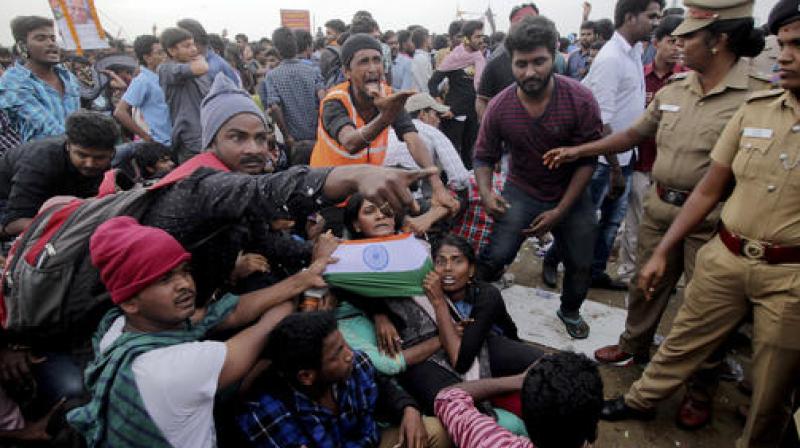Probe street battles in Jallikattu protest

Fortunately, quiet descended on the streets of Chennai and elsewhere in Tamil Nadu on Tuesday after violent protests the previous day. But the transformation of a fairly peaceful protest over several days in support of the traditional Jallikattu bull-taming sport into its diabolical opposite must be seriously investigated. If this is not done, and appropriate action not taken to address grievances or track down motivated troublemakers, the recurrence of untoward developments can’t be ruled out. That about a hundred policemen and many protesters were injured in day-long ding-dong street warfare speaks of the mood of mindless violence that gripped the southern metropolis. Petrol bombs were hurled at the police. At the Ice House police station in central Chennai, sections of the mob locked up 15 policemen inside and set the place on fire in a conscious attempt to murder the keepers of law and order. Another police station was ransacked.
These are the kinds of incidents that are generally seen in terrorism-prone states across the country. Fortunately, firearms are not ordinarily stocked in police stations in an ordinarily peaceful city like Chennai. Else, it isn’t unlikely that troublemakers could have tried to storm the armoury. It is noteworthy events took a regrettable turn even as the state Assembly was giving shape to a new law to allow Jallikattu. It is hard to see why pro-Jallikattu people would do that. That leads to the question if the protest was infiltrated by extremists with a violent agenda. It is said that violence erupted following the circulation of videos on the social media showing policemen burning vehicles. If true, this is a very serious matter. The police called these videos “fake”. But to carry conviction an independent inquiry by responsible and respected citizens is called for on an urgent basis. Exemplary punishment must be meted out if any policemen are found guilty.
At the same time, the lessons learnt from this protest should make the authorities inquire if Tamil Nadu is being sought to be made a base by extremist elements of one kind or another and take immediate action to check the tendency. This should be of an administrative as well as political nature. The sudden change in tempo of the Jallikattu movement also speaks of subterranean resentments across the state possibly prompted by a long-term denial of riparian flows from neighbouring states, which has led to a drought situation in some parts, and the unresolved issue of the arrest of Tamil fishermen by Sri Lanka. The Centre needs to pitch in and take the initiative to restore a genuine federal spirit in dealing with inter-state resources such as water, to check extremism, and should at the same time deal with Colombo.

